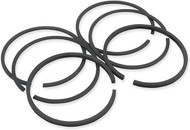Why Use Moly Rings Rather Than Cast Rings?
Published by Steve Koch, Northern Auto Parts on Nov 19th 2023
Piston rings are small components responsible for sealing the combustion chamber, regulating oil consumption, and transferring heat from the piston to the cylinder wall. Among the various types of piston rings available, two prominent categories stand out: Molybdenum (Moly) rings and Cast iron rings. Each type brings unique properties and advantages, influencing engine performance, durability, and maintenance requirements. By understanding the differences between the two, you can make an informed decision for optimal engine performance and longevity.
What are Moly Rings?
Moly rings, short for Molybdenum rings, are piston rings coated with a Molybdenum compound. This coating is known for its exceptional heat resistance and ability to reduce friction. Moly rings are often used in high-performance and heavy-duty engines due to their durability and efficiency in harsh conditions.
The Molybdenum coating enhances the ring's lifespan and improves the seal between the ring and the cylinder wall. This results in better compression, reduced oil consumption, and improved engine performance. Moly rings are particularly beneficial in engines that undergo high stress or operate at elevated temperatures, where the properties of Molybdenum can significantly contribute to the engine's reliability and efficiency.
How Do Moly Rings Compare to Cast Rings?
Moly and cast rings serve the same fundamental purpose in an engine but differ significantly in material composition and performance characteristics. Cast rings, typically made from cast iron, are a traditional choice known for their cost-effectiveness and satisfactory performance in standard applications. Compared to Moly rings, cast rings generally have a shorter lifespan and are less effective in high-stress environments.
The critical difference lies in their resistance to wear and heat. With their Molybdenum coating, Moly rings are far superior in withstanding high temperatures and reducing friction. This makes them ideal for high-performance engines with much higher heat and stress levels. Moly rings provide a better seal, enhancing engine efficiency and power output. While cast rings might be sufficient for regular, low-stress engine operations, Moly rings are the preferred choice for engines that demand higher durability and performance.
What Are the Benefits of Using Moly Rings?
Moly rings offer several advantages over traditional cast rings, particularly in high-performance or heavy-duty engines. One of the primary benefits is their enhanced durability. The Molybdenum coating on these rings significantly increases their resistance to wear and tear, making them last longer than standard cast rings. This durability is especially beneficial in engines operating under high stress or elevated temperatures, where cast rings might fail sooner.
Another advantage is the improved sealing capability of Moly rings. They provide a tighter seal in the cylinder, crucial for maintaining compression and optimizing engine performance. This tighter seal boosts power output, improving fuel efficiency and reducing emissions.
Moly rings are known for maintaining their shape and integrity under extreme conditions. This characteristic ensures consistent performance and reliability, reducing the likelihood of engine problems related to ring failure. For engine builders and enthusiasts who prioritize performance and longevity, Moly rings are often preferred over traditional cast rings.
How Do Moly Rings Affect Engine Performance?
Moly rings contribute significantly to engine performance in several ways. Their superior sealing ability ensures maximum compression in the engine's cylinders. This enhanced compression leads to more efficient fuel combustion, increasing horsepower and torque. For performance enthusiasts and racers, this boost in power can be a crucial factor in achieving optimal performance.
The reduced friction offered by Moly rings is vital in enhancing engine efficiency. Lower friction means less heat and wear on the engine components, leading to smoother operation and potentially longer engine life. This aspect is particularly beneficial in high-performance engines where minimizing friction is critical to maintaining peak performance.
What Makes Moly Rings a Durable Choice?
Moly rings are renowned for their durability, a crucial factor for engines subjected to high stress and demanding conditions. This durability stems from several critical characteristics of Moly rings:
- Resistance to Wear: Moly rings are exceptionally resistant to wear, thanks to the hard molybdenum coating. This coating provides a robust barrier against the frictional forces encountered in the engine, significantly extending the lifespan of the rings compared to traditional cast rings.
- Heat Tolerance: High-performance and heavy-duty engines generate considerable heat, which can harm engine components. Moly rings exhibit excellent heat resistance, maintaining their integrity and performance even under extreme temperatures. This quality ensures consistent performance and reduces the risk of ring failure.
- Adaptability to Various Surfaces: Moly rings can conform more effectively to cylinder walls than cast rings. This adaptability allows for better sealing and reduced wear on the rings and the cylinder walls, further enhancing their longevity.
- Oil Film Retention: The surface properties of Moly rings aid in retaining a thin film of oil on the cylinder walls. This oil film is crucial for lubrication and cooling, reducing wear on the rings and the cylinder walls.
Moly rings offer a combination of wear resistance, heat tolerance, adaptability, and oil film retention, making them a durable choice for engines that demand high performance and reliability. Their ability to withstand harsh conditions while maintaining their integrity earns them a preferred option for engine builders and enthusiasts.
The Optimal Choice for Engine Longevity and Performance
Choosing moly rings over cast rings is wise for those who value engine durability, efficiency, and heightened performance. Moly rings excel in wear resistance, minimize friction, and provide superior sealing, which is crucial for engine longevity and optimal functionality.
These rings are an excellent investment for automotive enthusiasts and professionals, offering significant long-term benefits for various engine types. Whether used in high-performance racing engines or everyday vehicles, Moly rings deliver a remarkable combination of durability and efficiency. Their contribution to engine health and performance makes them an outstanding choice for enhancing and maintaining engine integrity.

